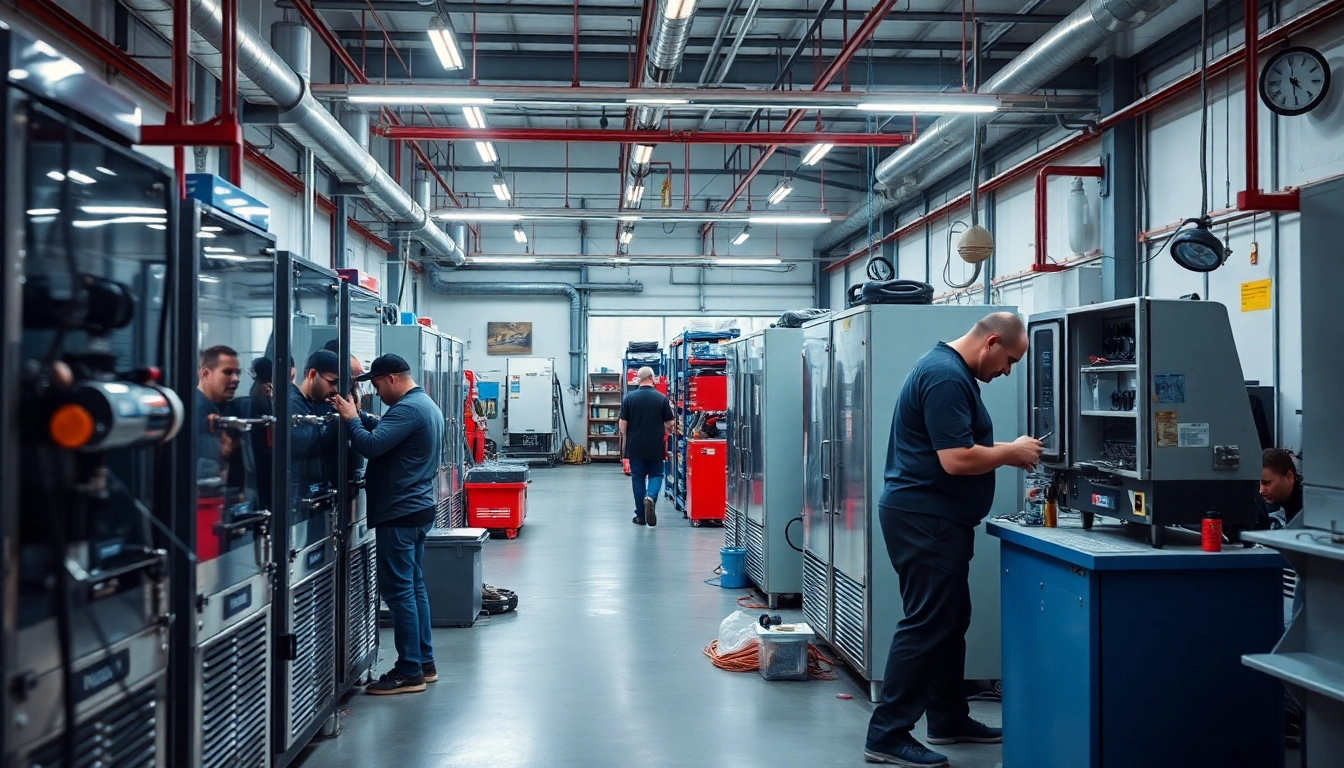Understanding Ice Machine Repair
Ice machines play a crucial role in various industries, especially in restaurants, bars, hotels, and hospitals. They ensure a steady supply of ice for drinks, food preservation, and medical needs. However, like any other appliance, they can malfunction or require maintenance over time. This comprehensive guide aims to explore the nuances of ice machine repair, detailing common issues, the repair process, cost implications, and best practices for maintenance.
What is Ice Machine Repair?
Ice machine repair refers to the process of diagnosing and fixing problems related to ice-making units. These repairs can range from minor adjustments and part replacements to more complex repairs involving electrical and refrigeration systems. Given the variety of ice machines available—from freestanding models in homes to commercial machines used in restaurants—the scope of repair work can be quite broad. Understanding the types of repairs needed is essential for ensuring that your ice machine functions optimally and meets your needs.
Common Ice Machine Issues
Owners of ice machines commonly encounter several issues that may necessitate repair. Some of the most frequent problems include:
- Ice Production Problems: Insufficient ice production can stem from various factors, including a malfunctioning thermostat, clogged water filters, or low water supply.
- Freezing Components: Ice machines can freeze up if the water supply is restricted or if there are problems with the heating elements.
- No Ice Cubes: Sometimes the machine may fail to produce any ice at all due to issues like a faulty ice maker control board.
- Leaking Water: Leaks can occur due to faulty seals, hoses, or fittings and can lead to puddling, which may damage the machine.
- Unusual Noises: Grinding or clanking noises may indicate mechanical issues within the machine that require immediate attention.
Signs You Need Professional Repair
Knowing when to seek professional help is crucial to maintaining your ice machine’s functionality. Here are signs that indicate it’s time to call a technician:
- Persistent Problems: If the machine continues to perform poorly after basic troubleshooting and resets.
- Power Issues: If your machine won’t turn on or has erratic power supply, it may indicate underlying electrical problems.
- Unusual Smells: Bad odors can signify mold or burnt electrical components that require professional inspection.
- Water Puddles: Excess water pooling around the machine suggests leaks or malfunctions that need urgent repair to prevent further damage.
- Age of the Unit: Older machines may need an assessment for repair vs. replacement when problems arise.
The Ice Machine Repair Process
Initial Inspection and Diagnosis
The first step in the repair process is a thorough inspection of the ice machine. A trained technician will review the unit’s operational history, listen for unusual noises, and visually inspect for leaks or other physical damage. They will also check the following:
- Sensor functionality.
- Water flow and pressure issues.
- Electrical components for faults.
After completing the inspection, the technician will provide a detailed diagnosis and recommend repair options based on the findings.
Common Repair Techniques
Repairing an ice machine may involve various techniques, including:
- Component Replacement: Damaged parts, including compressors, water pumps, or thermostats, are replaced with new, compatible components.
- Clogs and Obstructions Removal: Cleaning clogged filters and lines to ensure even water distribution and proper flow.
- Electrical Repairs: Fixing wiring issues or replacing malfunctioning electronic controls to restore functionality.
- Leak Repairs: Addressing any issues causing leaks through resealing or replacing faulty fittings or hoses.
Parts Replacement and Maintenance
Regular maintenance can reduce the frequency of repairs significantly. Most repairs involve some level of parts replacement, and regularly maintaining critical components can help extend the life of your ice machine. Common replacement parts include:
- Water filters.
- Icemakers.
- Refrigerant components.
- Drain pumps and hoses.
Utilizing high-quality components during repair work helps ensure better performance and longevity of your ice machine.
Choosing a Professional Ice Machine Repair Service
Factors to Consider When Hiring
When opting to hire a professional ice machine repair service, consider the following factors to ensure you select a competent and reliable provider:
- Experience and Expertise: Look for companies with a proven track record in ice machine repairs and knowledgeable technicians.
- Customer Reviews and Testimonials: Positive feedback from previous customers can be a good indicator of service quality.
- Service Range: Ensure the company can handle repairs for your specific ice machine model and brand.
- Emergency Services: Some companies offer 24/7 emergency repairs, which can be critical for commercial settings.
- Warranty on Repairs: A reputable repair service should provide a warranty on the work performed and any parts used.
Benefits of Professional Repair Services
Hiring a professional for ice machine repairs has numerous advantages, including:
- Expert Diagnosis: Professionals have the training and tools needed to accurately diagnose and fix issues quickly.
- Safety Considerations: Repairing ice machines can involve electrical and refrigerant systems that require expert handling to ensure safety.
- Time Savings: Rather than troubleshooting yourself, professionals can often complete repairs more efficiently.
- Preventive Maintenance: Technicians can provide guidance on maintaining your machine to avoid future issues.
Preparing for a Technician Visit
When scheduling a repair, being prepared can help ensure a smooth process. Here are a few tips:
- Provide detailed information about the issues you’re experiencing and any troubleshooting you have attempted.
- Ensure the area around the ice machine is clear for easy access for the technician.
- Gather any warranty or service agreement documents to share with the technician.
- Inform the technician of any specific brand or model information that may relate to your repairs.
Cost of Ice Machine Repair
Average Repair Costs
The cost of ice machine repair varies based on several factors, including the type of repair needed and the technician’s rates. On average, you may expect to pay between:
- $100 to $250: For basic repairs such as cleaning, unclogging, or replacing a valve.
- $250 to $500: For more extensive repairs involving replacement of critical parts like compressors or electronic control boards.
- $500 and above: For major issues requiring extensive work or when multiple parts need to be replaced.
Factors Affecting Repair Prices
Several factors can influence the overall cost of ice machine repairs:
- Type of Ice Machine: Commercial units are typically more expensive to repair than residential units due to complexity and parts availability.
- Location: Repair costs may vary significantly depending on your geographical area and local market rates.
- The Extent of Damage: More severe damage typically warrants higher labor costs and part expenses.
- Routine Maintenance: Regularly maintained machines may incur lower repair costs in the long run.
When to Repair vs. Replace
Deciding whether to repair or replace an ice machine hinges on several considerations:
- Age of the Machine: If the machine is older than 10 years, it may be more cost-effective to replace it rather than invest in repairs.
- Cost of Repair: Typically, if repair costs exceed 50% of the machine’s value, replacement is the better option.
- Frequency of Repairs: If repairs occur frequently, it may indicate that the unit is nearing the end of its life cycle.
- Efficiency
:
Older machines may not be energy efficient; newer models could offer substantial savings in energy costs.
Maintaining Your Ice Machine for Longevity
Routine Maintenance Tips
Regular maintenance can significantly extend the life of your ice machine and prevent costly repairs. Here are some key maintenance tips:
- Regular Cleaning: Clean the interior and exterior of the machine regularly to prevent buildup of bacteria and mineral deposits.
- Inspect Filters: Change water and air filters on a recommended schedule to ensure optimal water flow and machine operation.
- Check Water Supply Lines: Regularly inspect for leaks and clogs in water supply lines to prevent water-related issues.
- Monitor Temperature Settings: Ensure the machine is running at the correct temperatures for ice production.
Best Practices for Ice Machine Care
In addition to routine maintenance, consider adopting these best practices to care for your ice machine:
- Use Quality Water: Hard water can lead to mineral buildup and impurities, which can affect ice quality and machine longevity.
- Seal the Area: Maintain the area around the machine free from dust and debris, as buildup can impede properly functioning mechanisms.
- Professional Inspections: Schedule regular professional maintenance checks to catch potential issues before they turn serious.
- Educate Staff: Train staff on proper operational procedures to avoid misuse and wear and tear on your machine.
Understanding Warranty and Service Agreements
Understanding your ice machine’s warranty and service agreements can provide peace of mind and financial protection:
- Warranty Details: Know the specifics of your machine’s warranty, including coverage limits and the duration of applicable services.
- Service Agreements: Consider entering into a service agreement with a repair company to secure regular maintenance and repairs at a predetermined cost.
- Document All Repairs: Keeping accurate records of all repairs and maintenance activities can help when dealing with warranties or evaluating machine performance.



